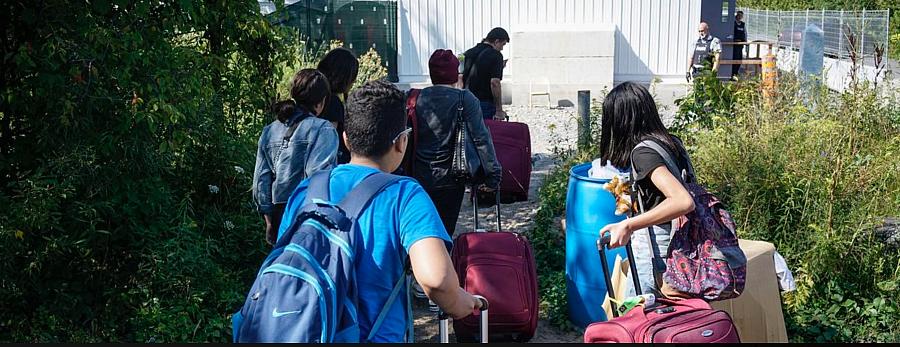‘We need your help.’ Are refugees getting mental-health assistance they need?

(Photo by Ricky Shore via Flickr/Creative Commons)
The father clutched his toddler tight. His wife and older children gathered close, dragging overstuffed suitcases along the gravel, inching toward the border.
They stopped.
“We need your help,” the man told an officer who stood on the opposite side of an obelisk that marked the line between two countries.
We need your help — and it wouldn’t be just this once.
As this Palestinian family crossed the United States-Canada border, they would likely need help for months and years to come. Most refugees do, and not just with resettling and securing housing, education, employment and physical health care. They need ongoing, long-term assistance with mental health care. They need help with issues that are rooted in the loss of their homes, careers and businesses — with the loss of their identities.
Scenes like this play out every day around the globe. The backstories and backdrops vary, but that message remains constant: They need help with mental health care, but are they getting it? And when they do, how well is it working?
My project for the 2020 National Fellowship will dive deep into this issue, explaining the myriad mental health challenges refugees face and taking readers up close to those realities through the experience of families.
“I don’t think you could be a refugee and not have issues,” said Sister Judy Carroll, a mental health counselor I met last year while working on a Buffalo News series called “The Other Border.” Photographer Derek Gee and I traveled the United States-Canada border along the northern edge of New York, venturing into Quebec and Ontario and capturing stories of law enforcement and security, tourism and customs technology. But the stories that affected me most were those of refugees, like the ones with whom Carroll works. She told me of a doctor who was the head surgeon at the biggest hospital in El Salvador, but was now hoping to get an emergency-services job working on an ambulance, limited largely because of his lack of English fluency. “They realize this is going to be their life,” Carroll said. “You were a pilot in your own country. Well now, if you can’t learn English, you’re going to be cleaning offices.”
She introduced me to several refugees who are her clients, and many of them came to North America for the sake of their families. They wanted their kids to have better lives. “I
think what really keeps them (going) is, ‘I’ve lived my life. I’m here for my children,’” Carroll said. “It’s their children that help them to accept their losses, really.”
But those losses are tangible, and deep, and almost surely affect their children too.
As a border city, Buffalo has a vibrant population of people seeking refuge in the United States, and also those who are hoping to ultimately settle in nearby Canada. That puts the region where I work and live in a primary position — and arguably a position of responsibility — to support those refugees.
In what ways are we doing it well? And how can we do better?
That’s what my fellowship work will seek to uncover.
Even when mental health care is accessible and available to refugees, language and cultural differences can create barriers. So, too, does life in the midst of a pandemic. Transportation is less available. Movement is less safe. Jobs are tougher to come by. Mental health care is often offered by Zoom — but you need the technology to access it.
As I write this, the U.S.-Canada border is closed to all but essential travel, temporarily locking out many refugees who may have family waiting on the other side of a bridge that they simply aren’t allowed to cross.
Refugees come here looking for a new start, a chance for freedom, and an opportunity for their children to lead aspirational lives. I’m eager to tell their stories, show how the system is helping them, and identify where we can do more. I’ll examine where we are succeeding and failing. I’ll identify the stakeholders, examine what they are accomplishing, and where they might take more action. I’ll examine how COVID-19 has complicated the situation, and I’ll ask how efforts to embrace equity and diversity can help create change. I’ll explore what we can learn from other cities, and I will probe into the potential impact of the November presidential election.
I’ll reveal what is working, and why, and what isn’t working, but could.
I still think of that Palestinian family we saw in our border travels: a mom and dad, three teenage daughters, an adolescent son and small boy. They hoped to be taking steps toward a happy, healthy life by crossing the border.
I hope it worked out well for them. But even if I could track them down, truthfully, I likely couldn’t ascertain the answer — yet. Their journey is still beginning.
Follow my project on here at BuffaloNews.com, on Twitter, and here on the Center for Health Journalism website.
